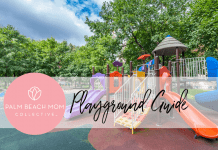Once in a while, everyone yells, and there are times when yelling is even necessary, like in an emergency. At the same time, no one wants to be the parent who yells all the time. We all want to connect lovingly with our kids, and for them to listen to us, with no yelling involved! Here are some tips by local experts, to feel calm, centered, and connected with your kids, even during those heated moments when you just need a minute to breathe.
Expert Roundup:
Hayley C. Schapiro, LCSW – Social Sense Palm Beach
You have had a day of repeating yourself, calling their name, and cleaning up mess after mess. You are tired and fighting a cold. You can’t negotiate or speak rationally to a toddler. One last question they already know the answer to, whine for a toy, or sibling fight in the car, that you need to referee— you yelled. You blew up. You erupted. You know better. Yelling does not change their behavior, you promised yourself you would not respond impulsively again, and most importantly you know how remorseful you feel afterwards. Yelling often fails to get the point across because emotions can cloud your teachable moment.
How do we not yell at our children? You are not alone in these feelings of frustration and confusion. A first step is to forgive yourself for yelling. It is an impulse and often a default. Where did that come from? That was not me. In seconds, I went from level headed fun mommy to scary monster screamer in the driveway for the whole neighborhood to see. I just yelled again, what am I doing to my children, they will be nervous wrecks forever. This negative self-talk is not helpful either. By yelling, we are modeling screaming as a conflict-resolution strategy. Not a good lesson. How can we expect our children to use an inside voice, when we do not always control ours? Yelling is not a strategy for correcting behavior, it’s a release.
Approaches we can exercise as parents:
- Figure out what triggers us, pushes our buttons and prepare for those moments and times of the day (e.g. bath time, homework, morning routine). This self-awareness will help you make better choices when frustrated. Utilize giving warnings, learning to let go, and “picking your battles.”
- Give yourself (as parent) a time out. Take a needed minute to reset. Step away and have a strategy to compose oneself (e.g. count to ten, make a coffee, call a trusted person). When parents practice self-regulation techniques, it helps kids learn these invaluable regulatory skills.
- Become knowledgeable on what is developmentally appropriate for your children’s behavior at their age. Is the behavior that frustrates us most, what our child is “meant” to be doing.
- Time management, not giving ourselves or our children enough time causes stress, which can lead to frustrated feelings and impulsive responses.
Desired behavior can be achieved through consistent expectations, routine, and praise. Reframing our reliable expectations will yield preferred results.

Hayley C. Schapiro, LCSW, is the Lead Clinician at Social Sense Palm Beach, a multi-service therapeutic center in downtown West Palm Beach. Hayley provides parent education and coaching as well as psychotherapy for children, families, and adults. Hayley graduated from Columbia University with a Master’s in Clinical School-based Supports and Services. Her expertise is individual psychotherapy, case consult, and evaluation. Hayley worked as a clinician for a large hospital network in New York City. There she provided diagnostic clarity for families and facilitated their transition to community-based services. Hayley was trained in administering assessments at New York Presbyterian Hospital. Prior, Hayley worked in multiple school environments, both public and private programs, where she provided mental health support, educational consult, crisis intervention, and group/family counseling.
Caley Kukla, M. Ed. – Play with Purpose
I spend a lot of my time translating children’s behavior. Why are they hitting, whining, not listening, yelling? That’s what motivates parents to call me – when the child displays undesirable behavior and they want to make it stop.
Often times, I begin by answering the parent’s questions about the child’s behavior. As we delve deeper into the situation and dissect the parent-child relationship, we eventually come to a heavy discussion about the parent’s behavior. I hear: “I don’t want to yell, but nothing else works. I lose my cool and then lose my mind.”
I gently step into the conversation of why we yell:
- Yelling is aggression.
- Aggression is rooted in fear.
- We may fear losing control. Others’ judgment. Failing at parenthood.
- The child may display an emotion that doesn’t feel safe to us because we were never allowed to express that emotion as a child.
- The first step to stop yelling is to notice when we yell.
- Is it when we feel overwhelmed? When the demands just keep coming?
- Maybe it’s when our children are being aggressive with one another. Someone is just always getting hurt.
Then, we can work to reset how we respond to triggering situations. Most often, the situations that trigger us go back to our own childhood. An important step to rewire our reactions is to better understand when and how that reaction began.
For example, I yell when I feel unseen, unheard, and my needs are not being met. Discovering these three root causes for my yelling, meant I had to go back into my childhood to understand why the situations trigger me. Then I work daily to feel safe while experiencing triggering situations. The feeling of safety and security is the antidote to aggression.
Here are the ways I’ve rewired my brain:
- Proactively check-in with myself to identify my own needs.
- When I start to feel overwhelmed with the needs of others, satisfy one of my own needs first.
- Identify my own emotions and learn what to “do” with them.
- Mantras that remind me that “I am safe” and “this is not an emergency”.
- Slowing down and decreasing the urgency of situations. The situation may feel urgent, but it is not an actual
- Find ways to play.
- Find ways to rest.
We need to notice, get curious, and find ways to meet those underlying needs before our bodies resort to yelling to discharge the repressed emotions. Then we will be able to effectively manage our own behavior, which will positively impact our children’s behavior!

Caley has a Bachelor’s Degree in Special Education and a Master’s Degree in Early Childhood Education from the University of Florida. For the past ten years, she has served families in a variety of different roles including teaching, early intervention, behavior therapy, parent educator in conscious discipline, and most recently as a PLAY Project Consultant. She specializes in differently wired children, with a speciality in Autism Spectrum Disorder. With two boys of her own, she has the ability to empathize with daily parenting struggles, while grounding her coaching in research-based, developmentally appropriate practices. Her mission is to change the world one family at a time while we raise the next generation to be compassionate, creative, and industrious leaders.
















